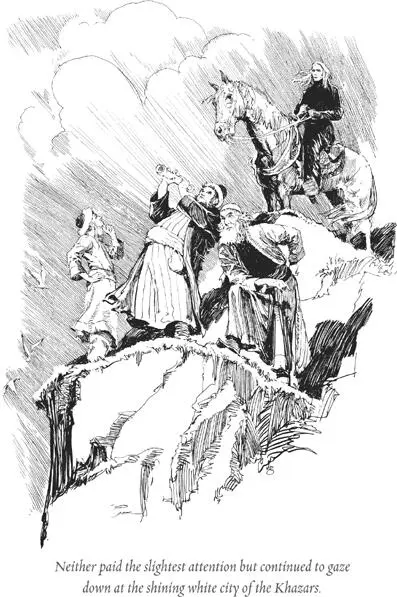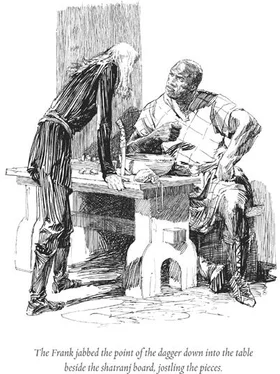Michael Chabon - Gentlemen of the Road
Здесь есть возможность читать онлайн «Michael Chabon - Gentlemen of the Road» весь текст электронной книги совершенно бесплатно (целиком полную версию без сокращений). В некоторых случаях можно слушать аудио, скачать через торрент в формате fb2 и присутствует краткое содержание. Жанр: Исторические приключения, на английском языке. Описание произведения, (предисловие) а так же отзывы посетителей доступны на портале библиотеки ЛибКат.
- Название:Gentlemen of the Road
- Автор:
- Жанр:
- Год:неизвестен
- ISBN:нет данных
- Рейтинг книги:3 / 5. Голосов: 1
-
Избранное:Добавить в избранное
- Отзывы:
-
Ваша оценка:
- 60
- 1
- 2
- 3
- 4
- 5
Gentlemen of the Road: краткое содержание, описание и аннотация
Предлагаем к чтению аннотацию, описание, краткое содержание или предисловие (зависит от того, что написал сам автор книги «Gentlemen of the Road»). Если вы не нашли необходимую информацию о книге — напишите в комментариях, мы постараемся отыскать её.
Gentlemen of the Road — читать онлайн бесплатно полную книгу (весь текст) целиком
Ниже представлен текст книги, разбитый по страницам. Система сохранения места последней прочитанной страницы, позволяет с удобством читать онлайн бесплатно книгу «Gentlemen of the Road», без необходимости каждый раз заново искать на чём Вы остановились. Поставьте закладку, и сможете в любой момент перейти на страницу, на которой закончили чтение.
Интервал:
Закладка:
The ghost in question was, however, no longer among this semi-legendary crew He had come to Amram's tent at dawn with a cold twist of a smile on his lips.
“If I don't ask you to leave with me,” he said, “it's only because I fear you'll turn me down out of sheer perversity.”
“Then, by that logic, you ought to tell me to stay,” Amram said.
“Stay,” Zelikman said. “Fight with strangers. Die on a gate, on a rampart, in a narrow, strange street.”
Amram lay back on the rough ground that had kept him awake all night and looked up at the radiance that had begun to light up the stripes of his tent.
“Maybe I'm tired,” he said. “Maybe I'm tired of picking up life in bits and fistfuls and little drawstring bags. When you get to be as old as I am, there's an appeal in the idea of seeing some business through from start to finish. Besides,” he said, “I don't know why, but I like the kid.”
Zelikman nodded, and then they embraced and spoke some plain words in five languages, all of them roughly synonyms for farewell.
CHAPTER NINE
War,” said Jose ph Hi rkanos to the ele phant. He spat on the grass and shook h is head and pulled at the braided strands of his beard. The elephant snorted as if in agreement, with her usual air of stoic disdain, and went on ripping up sheaves of chess grass with her scarified trunk and stuffing them into her mouth. Her own warlike career long past, she was a great placid dam of at least fifty who had been captured by Normans decades ago in a raid on Muslim Sicily and fetched home to Francia to be neglected by a series of improvident barons until the day, six months ago, that she was absorbed, by way of payment, into the far-flung and arbitrary inventories of the Hirkanos clan. “Bad for the Radanites.”
“Not always,” said his nephew, a would-be sharp operator who lacked for the satisfaction of his ambition only the quality of sharpness and who expended all of his energies, as far as Joseph could see, on preserving his opinions from contamination by experience. “War creates opportunities too.”
“In the short term,” Joseph said, and spat again. “Good in the short term is always bad in the long term.”
They stood on a low rise to the west of Atil, above the final bend in the tortuous road that led from the sources of the Danube, across plain and mountain and swamp, by ship and wagon, to the mouth of the Volga, a journey that had required eighteen months of hard travel. Joseph Hirkanos raised to his eyes one of those rare glasses of Persian manufacture that were a special line of his family's trade and scanned the horizon of his woes. A plume of dust half a mile tall moved against the southern sky, slow and menacing, a quill scribing oaths of rebellion along the shores of the Khazar Sea. The reports he had received, discounted by half for lies and bluster and by two-thirds for wishfulness, portrayed the rebels as a tough shank of perhaps five hundred Ar-siyah horsemen seething in a thin broth of Muham-madan irregulars and pimentoed with a fistful of Nestorians, pagans, worshipers of fire and Jews who wished for or foresaw the downfall of Buljan. All of them barbarians, in the view of Joseph Hirkanos, particularly the Khazar Jews. As with most of the Turkic hordes to come tumbling on horseback out of the eastern steppe, outward forms of worship were a matter of relative indifference to the Khazars, and Joseph had always suspected that their adoption of Judaism was not the result of divine calling so much as the mark of a politic reluctance to appear to side with either their country's Christian or its powerful Muslim neighbors.
“Ten years since my last visit, and the exact moment I arrive, a war breaks out,” Joseph Hirkanos said bitterly. If the Khazars, that tolerant and pragmatic people, had fallen prey to doctrinal strife, what hope was there for the world? “A religious war.”
“That is the least of our concerns,” said Menashe, his brother, appearing without a stir of air or a whisper in the grass. Like his brother and any successful Radan-ite Jew, he was addicted to the practice of stealth, silent and modest, fitted by training and nature to pass unremarked among the hostile and warring kingdoms except when the time came to buy or to sell, at which point, like some inverse hero in a legend, he would don his cloak of visibility and bestow the shining gift of trade on nations mired in the darkness of conquest and retaliation. “The Venetian will be dead by sunset.”
They had acquired the stock and services of an Italian merchant Jew in the city of Cherson, where the father of Joseph's nephew showing typically poor judgment, had succumbed to some kind of distemper. Now there would again be nine in their party a situation intolerable to an observant Jew particularly with evening coming on, though Joseph would hardly miss the Venetian's caviling or tendency to whistle tuneless tunes all day and night, even in his sleep.
“That is lamentable,” Joseph said, lowering the Persian glass and looking past his brother, like him hairless and fatless, with the hooded eyes and large ears of some prudent desert mammal, past his half-orphaned halfwit of a nephew, past the huddled mules and horses, past the circle of wagons with their covers of hide and shingled plank, filled with the fortune in furs, hides, lumber, iron and gemstones that he had amassed, bartered and shepherded under so much hardship all the way from Regensburg to this windswept hillock above the lightning fork of the delta, to Atil, a city whose rulers had always displayed a notable passion for the company of elephants. “But even worse, in the eyes of the Most Holy, than the impiety of nine little Jews would be the sealing of yet another trade route from West to East because of squabbling among the faiths.”
“One by one they are being lost,” his brother agreed, his ancestral memory of the decline of the great age of trade fleets and caravans reaching back, like that of all Radanites, to the fall of Rome and the rise of those warring stepchildren of Judaism, the followers of Islam and Christianity, who in violation of God's desire and teaching and above all his good sense would rather kill than haggle.
“That looks like a Frank,” the nephew said, and though his eyes were too young to require the optical arts of Persia and he had been born and raised among Franks, the uncles were so accustomed to ignoring his unbroken string of idiocies that neither paid the slightest attention but continued to gaze down at the shining white city of the Khazars spreading on either side of the river. By the time they turned to acknowledge the straw-haired stranger, mounted on a shaggy horse with a big nose, he was nearly upon them. Joseph just had time to note the band of pallor on the Frank's brow implying the recent loss of a hat, and the giant needle in his sword belt, which perhaps betokened membership in a mendicant order of holy haberdashers or some other monastic absurdity
“You are Radanites,” the lean-shanked stranger said in Frankish, and Joseph thought he detected a note of wonder in the stranger's voice, as if the man knew them not only by their braided beards and the style of their head wraps but had in fact met them before, in person, somewhere among all the roads and kingdoms. “Out of what country?”

“Francia,” the nephew said, before either of his uncles could lay the silencing hand of a vague reply across his fat fool lips. “Regensburg.”
“Ah,” the stranger said, and nothing more, as if the region and the name of the city meant nothing to him, so that Joseph's suspicions were aroused. The stranger swung down from his saddle and stretched his legs, making three slow circuits around the elephant, rubbing at his chin with a persuasive air of expertise, studying the channels and sierras of her hide with his fingertips, marking the graying stubble of her pate, the greater involution and deeper patina of her left tooth in comparison to the right, the skeptical cast of her eyes.
Читать дальшеИнтервал:
Закладка:
Похожие книги на «Gentlemen of the Road»
Представляем Вашему вниманию похожие книги на «Gentlemen of the Road» списком для выбора. Мы отобрали схожую по названию и смыслу литературу в надежде предоставить читателям больше вариантов отыскать новые, интересные, ещё непрочитанные произведения.
Обсуждение, отзывы о книге «Gentlemen of the Road» и просто собственные мнения читателей. Оставьте ваши комментарии, напишите, что Вы думаете о произведении, его смысле или главных героях. Укажите что конкретно понравилось, а что нет, и почему Вы так считаете.












